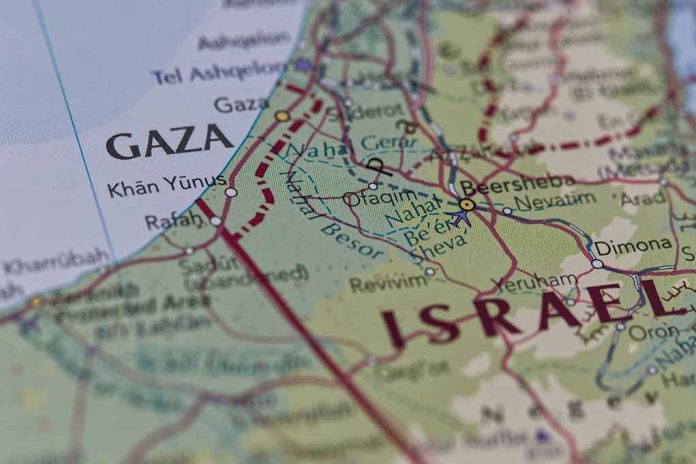
Israel’s upcoming negotiations with Hamas aim at sustaining peace and establishing long-term regional stability—it is a critical step that warrants global attention.
Key Takeaways
- Israel will negotiate the second phase of the Gaza ceasefire, focusing on hostage exchange and demilitarization.
- The discussions aim to prevent a “Hezbollah model” in Gaza, rejecting the Palestinian Authority’s presence.
- Despite scheduling delays, talks are set to start this week following a security cabinet meeting.
- Israel is exploring U.S. plans for Gaza redevelopment, while aware of other Arab state proposals.
Initiating Critical Talks
Israel plans to initiate discussions with Hamas in the Gaza Strip, focusing on a second phase of the existing ceasefire agreement. Foreign Minister Gideon Sa’ar confirmed these plans, emphasizing the need for a full demilitarization of the enclave while rejecting any “Hezbollah model” influence. The security cabinet recently convened, making a crucial decision to commence negotiations this week.
The negotiations will address regional stability and exchange points, including the release of Israeli hostages and Palestinian detainees. Despite anticipated negotiations before March 2, Qatar reports that formal talks have not yet begun, marking a pivotal moment in these diplomatic engagements.
Key Demands and Proposals
Sa’ar’s Atlantic conference statement reinforced Israel’s demand for Gaza’s complete demilitarization and minimal Palestinian Authority presence. Additionally, Israel has expressed interest in examining President Donald Trump’s redevelopment proposal, which could offer American control over revitalization efforts.
“A ‘Hezbollah model’ in Gaza would not be acceptable to Israel and therefore we need a total demilitarisation of Gaza and no presence of the Palestinian Authority,” Sa’ar clarified in the press conference.
Amid various international proposals, Israeli Prime Minister Benjamin Netanyahu acknowledges the U.S. proposal warrants further examination. These strategic decisions showcase complexities in international involvement while focusing firmly on political stances, ensuring comprehensive solutions while maintaining territorial security.
Israel, Hamas are marking 500 days of #Gaza conflict. The first phase of the ceasefire deal is set to expire in about 2 weeks, with negotiations for the next phase still ongoing. Gazans are hoping for a lasting ceasefire to begin rebuilding and returning to their ordinary lives. pic.twitter.com/gCuHfVKUgc
— CGTN Global Watch (@GlobalWatchCGTN) February 18, 2025
Toward Sustainable Peace
As negotiations advance, the primary goal remains regional stability and mitigation of existing tensions. Israel’s diplomatic pursuits signal its commitment to ensuring a peaceful environment through active, direct negotiations with Hamas. These engagements reflect Israel’s consistent strive towards achieving a safe and stable geopolitical landscape.
With Middle East stability hanging in the balance, the outcome of these negotiations could drastically influence the region’s future peace efforts, territorial governance, and humanitarian conditions, both now and for generations to come.





